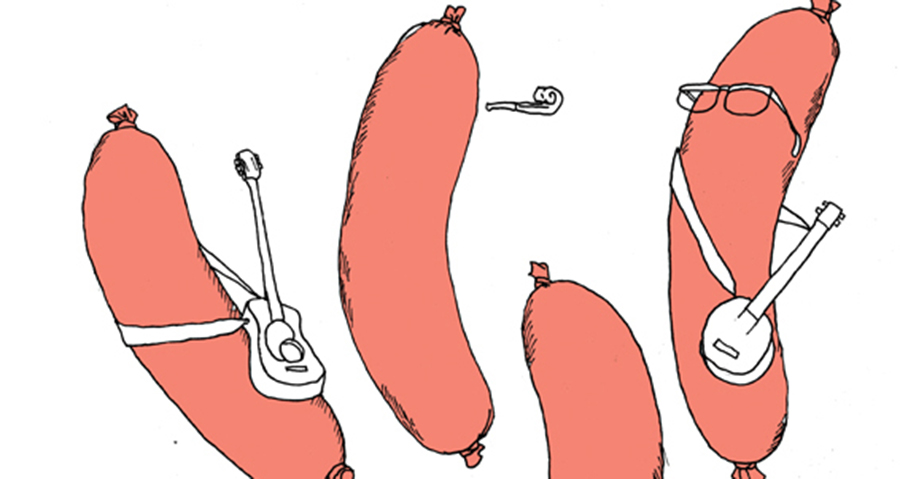
On Audacity and Possibility.
I do a lot of things, and I’m not the best at any of them. I can usually think of scads of people who are better at pretty much everything I do; from performance to organization, being a decent friend or a good videographer, I am well aware of how I think I stack up against other people.
Which isn’t to say I’m bad at what I do, nor that I’m not proud of my accomplishments. I’m pretty good at a bunch of things, and very good at a few. But still, still not the best at anything.
But while you can arguably say that Usain Bolt is the best at running fast, or that Lance Armstrong is the best at winning the Tour de France (which he is, though he cheated to accomplish that), it’s hard to point to someone who’s the best writer or the best at running a festival. It’s so subjective, and fame or financial success doesn’t necessarily reflect quality.
I grew up with the idea firmly planted in my mind that talent and skill get recognized, no matter how modest you are, and that you don’t blow your own horn. If you don’t get recognized, it’s clearly because you aren’t as talented or skilled as you thought. But years of watching people accrue recognition and opportunity where it was undeserved created a bitter sense of injustice in me, and not just on my own behalf. I belong to an incredibly talented community, people deserving of all the best things, and to see them passed over again and again is painful.
And it’s not rocket science; if you want to be something, you can’t just harbour that dream in a quiet space in your mind and hope someone will suss it out and offer that thing to you. But good god, that’s a difficult thing to remember and put into action, and sometimes it’s socially dangerous.
This is actually one area where I think being Canadian is a real detriment; we’re self-effacing to a fault, and we think anyone who mentions their own accomplishments is kind-of a jerk. We don’t boldly put ourselves forward when opportunities arise; we wait to see if someone more qualified, more deserving, steps forward first. And while most of the reasonably qualified and deserving people hesitate, somebody steps forward and claims it.
There’s an excellent example in the JUNO Awards. How many times have I heard a band grumble that they’ve never been nominated for a JUNO? But if you ask how many times they’ve submitted their music, the answer is a blank look. It hasn’t occurred to them that they have to send their music in and alert CARAS that they’d like to win an award (Submissions are open right now, by the way, and yes, you really do have to nominate yourself or ask someone else to nominate you for most awards).
 They’re not stupid; they’ve just been conditioned to think that if you’re good enough, recognition will come to you.
They’re not stupid; they’ve just been conditioned to think that if you’re good enough, recognition will come to you.
It’s probably one of the biggest lies I’ve ever swallowed, aside from the one about the necessity of a university degree (Dear every authority figure who spoke to my teenage self: blow me). And I’ve been trying for a few years now to disentangle it from my behaviour. Because even though I know intellectually and have ample daily proof that they’re not true, I still can’t quite get over these ideas:
Opportunities do and should go to the best. It’s so demonstrably silly that I don’t even feel like I need to refute it. But because I know – and this really is true – that I’m not the best at the things I do, I sometimes think – and this is not true – that I don’t deserve those opportunities. This is such a stupid idea it’s embarrassing to admit that it has such a hold on me, but I’ve let a million cool things pass me by because I thought someone else (who? I don’t know!) deserved them more.
It’s not polite to boast. No, it’s not, and braggarts are super-annoying, but there’s a big difference between telling someone you’re good at something and boasting about it. I have a hard time pin-pointing where the difference lies, and I’m not the only one: I’ve found that some of my more self-effacing acquaintances start to give me a hard time about the size of my ego when I talk about my accomplishments. Considering that these are mostly the self-same people whom I wish would speak up for themselves a little more, I try to ignore them.
When a friend told me that he’d passed a course ‘with flying colours, top of the class,’ it was a relief to hear someone say something unequivocally positive about themselves. It’s a pleasure to celebrate the accomplishments of people you like; I wish more of my friends would give me that pleasure. Another friend mentioned on stage that he’d won a JUNO, and people in the audience complained later about his boasting, to my lasting irritation. This social pressure to keep quiet about your achievements is ridiculous, as it’s mostly borne of jealousy, an emotion they really should feel bad about expressing in public.
I want to hear about these things – to luxuriate in the delight and pride of people I think are deserving – the successful grant, the promotion, the gallery opening for your first solo show. I even (for a little while) want to hear about how awesome your new relationship is. Expressing happiness about your accomplishments won’t diminish the universal supply, regardless of what some people seem to think. And how else am I supposed to know that you’re a talented videographer, or a skilled knitter? Tell me about it!
Internalized impossibilities. Sometimes when a goal or opportunity seems too good or too desirable, I convince myself that it’s impossible. Maybe because I don’t know anyone who’s ever done such a thing, or maybe because I know too many people who are doing it, or god, whatever. Who cares why? It’s completely illogical, and extremely unhelpful. I was once a strong candidate for an internship whose job title should have been ‘Awesome Internship Designed Exclusively for Candace Shaw,’ and I’m fairly certain that I didn’t get it because I convinced myself I couldn’t.
When I believe something’s possible, it usually is. And when I am convinced that something is not only possible, but also likely, it usually lands in my lap with no effort. I’m not talking delusional possibilities – no matter how likely I think it is that I could sprout wings, it ain’t gonna happen. But within certain parameters, it happens all of the time.
The trick, unfortunately, is a hard one to pull off intentionally, and I’ve mostly been successful with goals that don’t mean as much to me. I’m working at it, whittling down my internal resistance to those things that seem too good to be possible (another thing that’s so stupid it’s embarrassing to admit – but I’m sure I’m not alone in this). And while I’m busy with that work, I’m also trying to learn how to analyze my failures and see where I went wrong without becoming disheartened by them.
This is not The Secret; this is the audacity of believing that you are capable of rising to a challenge, or of deserving good things, and it gives you the confidence to pursue them where others hang back.
Audacity is a negative adjective. I’m going to be honest; until I looked up the word audacity yesterday, I thought it was a pretty negative term. But that’s mostly the usage of people around me; no one ever says that someone has behaved audaciously unless they mean that the person is a brazen jerk. But the dictionary definition of the word is primarily one of daring, boldness, and confidence, the exact traits that I’m trying to cultivate in myself and encourage in others.
Let us be audacious: when opportunities arise, let’s say ‘I may not be the best, but I’m ready to give it the old college try‘ and dive right in. If someone responds negatively, don’t let their issues deter you. You may, indeed, fail – I do all of the time – but knowing that failure isn’t permanent nor telling, and that it usually takes many failures to learn which possibility is the right one for you, is the key to eventually succeeding. It’s incremental; each time you try something new, you’ll get some parts right, and some parts wrong, and if you’re smart, you learn from the failures. Next time, you fail differently.
My successes reflect well on my friends, family, and community; these are the people who make it possible for me to attempt the things I do. They give me the platform for success that I talked about in my article on jerks. But my failures don’t reflect poorly on them, and I’m starting to realize that they also don’t (generally) reflect poorly on me. I’m nearly always in over my head, and experienced people can often see that, and they applaud my audacity. Doing pretty much the same thing is how most people get experienced in the first place.
I’m not the best, but then, who is? There will always be people better and worse than I am at everything I try. Embracing audacity and possibility isn’t a magic trick that will give me everything I want, but it’s a damn sight better than watching other people grab opportunities and wishing bitterly that I could have them, too. Recognition and reward almost never go to the most deserving, nor the best: fortune favours the bold.
There’s no time to rail against the injustice of it all; make it work for you.





6 Comments
Sarah
Another great article! This one struck a chord because I think about this a lot in my field where there are many more people with “audacity” than those without – though I have never thought of it like that. I always think of it as “entitlement” – whatever it is, I wish I had more! People with backgrounds where they are told they have to earn things and prove themselves and don’t get handed anything without hard work and effort tend to have this self-doubt or fear, but I have encountered A LOT of people who expect that they will get things (position, power, salary) even if they don’t deserve it and on the contrary would never even stop to think if that’s an issue. It’s freedom, really. I think their backgrounds in general facilitate that very few people have ever humbled them by saying no to them or reminding them that they may not deserve something AND they have nothing to lose – if they don’t get said position they can continue mooching and trying for other awesome opportunities where other people feel thankful and blessed by their accomplishments. It’s a balanced for sure, but I agree, I want to try to have more audacity but still feel eternally grateful for everything.
Sarah
I should say other people might feel lucky or even undeserving or the imposter complex instead of “thankful and blessed” as I said above… it goes further than just feeling thankful. It’s too bad.
Chuck
For me, and one can really only speak for oneself, the term “success” has always been a malleable item. Early on I recognized that it didn’t really mean monetary riches. Nor did the whole “best at what you do” and gaining the respect or envy of others really work either. When graphics became my livelihood instead of my hobby, it lost some of the magic it had given me since childhood. The same with acting. After 50 or so plays and then time spent in front of microphones and cameras, the emotional content was gone and it became lateral-thinking work. Whether I learned public speaking through improvisation instead of paying for lessons at a podium or went back to work at night to “play” on the computer to understand how best to achieve graphics, the payoff was internal as well as whatever achievements came as a result. Good. Then I became a father. Yes parenting takes incredible effort and the responsibility of child-rearing makes one (okay, me) question my actions and what comes out of my mouth due to the effect on my son. This was a different ballgame. Lateral-thinking pales beside emotional content. Whatever talents one possesses, whatever heights they reach in a particular field, it is only one part of life. And it doesn’t last. It is satisfying, yes, but I don’t feel it gives as much a feeling of “success” as relationships with family, friends, pets and even with oneself. But that’s just me.
Candace
Sarah,
Thank you so much!
I’ve worked with a lot of entitled/audacious people, too, and it’s really frustrating – while on the one hand, I wish I had their confidence, on the other, I’m glad that I’m more self-aware. And trying to find the balance between those two is really hard.
I find, too, that a lot of people who come from the ‘work hard and prove yourself’ camp tend to pooh-pooh any opportunities that come by chance, as though things achieved without hard work don’t count. For me, I’m trying to embrace my lucky chances as well as the ones I feel like I’ve earned; really, it matters most what you do with it, not so much how you got it.
I completely agree – a feeling of gratitude goes a long way, and knowing that no one gets anywhere without a lot of stumbling and help from other people is essential.
Candace
Chuck,
Thanks so much for reading!
I agree – success isn’t necessarily money, nor career stuff – for me, it’s everything you do. I’m just as bad at recognizing romantic opportunities or personal opportunities; there are so many cues I seem to overlook.
Financial success is certainly part of my ambition, but I’d never trade a lot of the fun work I get to do for a bigger paycheck. I’m trying to find ways to make the things I love to do pay, and that for me will be success, as well as falling in love, getting married, seeing a lot of live music, travelling, etc. It’s all part of the overall package.
Daniel Lindenberger
Candace,
Ever since my wife (and your old neighbour) Aimée (was Brown) pointed this article out to me it has become a major point of periodic discussion for us. We both now read it regularly to remind ourselves to not be afraid to both be radiant and to let people know that we are and that we’re up to interesting stuff.
Thank you for the audacious, inspiring work.